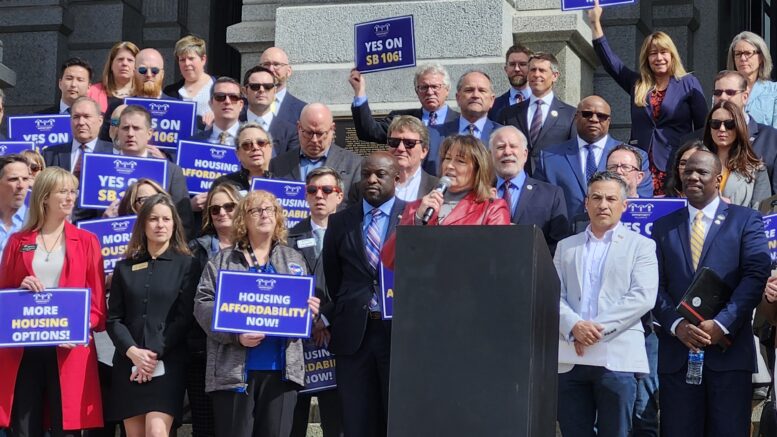Construction-defects-reform advocates cheered when Gov. Jared Polis backed their cause this year. But halfway through the 2024 session, their main bill is stalled in a committee while a proposal to roll back homebuilders’ protections is moving forward.
The past week was a significant one in the debate over whether Colorado must make it more difficult for residents to file construction-defects lawsuits in order to bring condominium builders back to the state and re-start that sector of the housing market. And next week is likely to be equally as crucial, with the fate of the two major proposed reforms to the legal system hanging in the balance with key votes on Tuesday and Thursday.
This past Tuesday, the Senate Local Government & Housing Committee heard Senate Bill 106, which would give builders a right to remedy defects, would increase thresholds for condo associations to sue from a majority to 67% and would mandate builder-required alternative dispute resolution. Facing seeming opposition from the four Democrats on the seven-member committee, despite sponsorship of Democratic Sens. Rachel Zenzinger of Arvada and James Coleman of Denver, the committee postponed a vote until March 12.
Then on Wednesday, the House Judiciary Committee advanced to the full chamber by a 7-4 vote House Bill 1230, a proposal that Democratic Reps. Jennifer Parenti of Erie and Jennifer Bacon of Denver described as a means of boosting consumer protections for homeowners. It would extend from 6 to 10 years the statute of repose on construction defects, delay the point at which the two-year statute of limitations begins, let neighborhood associations file defects lawsuits over single-family homes and add prejudgment interest for plaintiffs.
A pair of clashing proposals
Bacon noted that the two bills could work together if both pass through the Legislature, as the House bill does not contemplate the right to remedy that the Senate bill seeks to add and the Senate bill doesn’t deal with statute of repose or the ability for group single-family-home lawsuits. But the two are clearly in opposition to each other, and the underlying conflict is the same in both bills — the rights of homeowners to fix problems versus the skyrocketing costs of insurance, often linked to lawsuits, that have driven builders from the condo market.
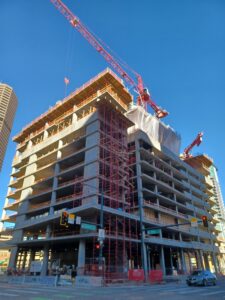
Crews build a multifamily property in downtown Denver.
On one side — and struggling to gain traction right now — are construction professionals and metro mayors who believe that the 15-year drop-off in the number of condos built in Colorado can be addressed only by cutting the frequency and magnitude of lawsuits. Without condos, younger and lower-income residents have trouble stepping into home ownership, a step that is needed to cut the racial and generational wealth gaps in Colorado, Coleman and other supporters argued.
“Our homes are built by humans who sometimes make mistakes, and if there is any issue, that needs to be repaired,” said Kathie Barstnar, executive director of real-estate development group NAIOP Colorado. “But we can focus our culture on one of making it right rather than focusing our culture on the courtroom.”
More construction and homeowners’ rights
On the other side, skeptics argue that the disappearance of new condos has more to do with the higher profitability of building apartments and say that homeowners’ rights can’t be reduced just to spur a sector of the market. Having been on the defensive for a decade, homeowners’ associations and plaintiffs’ attorneys are pushing back, claiming Colorado’s legal playing field already is tilted toward builders and needs to be changed to force builders to fix defects and honor warranties.
“I too represent a district where not only do we have a lot of new construction going on, but part of the narrative is the need for more affordable construction,” Bacon said. “I feel that our role as a Legislature is to right-size industry so that it could operate but that those who interact with it don’t have to go bankrupt themselves to deal with it.”
There’s no debate condo development has plummeted, with Zenzinger noting that 76% fewer of the typically more affordable condos were built in 11 Front Range counties between 2018-22 than between 2002-08, according to a Common Sense Institute study. The Front Range had 146 active condominium developers in 2007 but has just 23 now, as insurance costs for putting up for-sale multifamily residences is 5.5% of total building costs — a rate 233% higher than for other homes, noted Peter LiFari, executive director of Maiker Housing Partners and a CSI fellow.
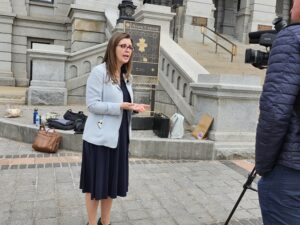
Colorado state Sen. Rachel Zenzinger answers media questions about her construction-defects reform proposal.
LiFari links the decline directly to state defects law, and Zenzinger pointed to a 2007 bill that allowed condominium associations to sue over cumulative defects that could be technical and that haven’t caused injury or brought about imminent danger. Another change proposed in SB 106 would require actual damage to real property or to individuals for legal action and require the risk of injury or death to be “imminent and unreasonable.”
The case to roll back builder protections
While Zenzinger and other backers called that a “balanced” approach to jump-starting more affordable-housing construction — a keen focus for Polis, which pushed him to call for defects reform in January’s State of the State Address — opponents disagree.
ProgressNow Colorado Executive Director Sara Loflin said the “imminent” harm clause could delay fixes until homeowners are getting severely hurt. John Krueger, vice president of HOA management firm Associa, said getting two-thirds of condo owners to agree to sign onto a lawsuit in a 90-day window is a threshold so high that it would prevent defect fixes.
Preventing harm and damage is central to HB 1230, which Parenti said she developed after reading about and hearing from multiple groups of homeowners in her district whose foundations have sunk, exteriors have crumbled and garages have separated. She also has heard about builders being unresponsive or saying their warranties are shorter that state law requires, which is why she added a provision make it violation of the Colorado Consumer Protection Act to attempt to limit mandatory homeowner protections.
Supporters of that measure say that even current protections are too limited, citing the fact that the two-year statute of limitations for filing lawsuits begins when a defect is first spotted, not at the later point when the cause of the defect is linked to builder error. HB 1230 would change that and would add awards of prejudgment interest to successful plaintiffs as an incentive, Parenti said, for builders to avoid trying to run out the clock and extending beyond the two-year timeframe when they’re no longer liable for fix costs.
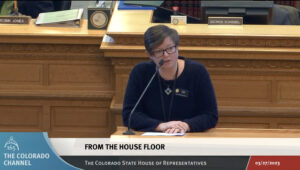
Colorado state Rep. Jennifer Parenti speaks on the House floor during the 2023 legislative session.
Even more construction-defects proposals
But the changes in that bill could have significant repercussions that include stunting the single-family-home market in addition to the already depleted condo market, argued Ted Leighty, CEO of the Colorado Association of Home Builders. If single-family homeowners can band together to file defects lawsuits, insurers would flee that market as they’ve fled the condo market, making it much harder for builders and trade contractors to obtain the insurance needed to do work and raising overall construction costs, he said.
Two other bills factor into the overall legislative discussion on construction-defects reform as well.
SB 112 not only would raise to 67% the threshold for condo HOAs to file defects lawsuits but would sever the liability of construction professionals involved in projects, meaning that legal actions must be focused on the subcontractor that caused the defect rather than the deep-pocketed general contractor — an idea that Zenzinger initially contemplated for her bill. However, legislative observers give that bill, sponsored by Republican Senate Minority Leader Paul Lundeen of Monument, little chance of passing out of the Senate Local Government & Housing Committee when it comes up for a hearing on Thursday morning.
There also is HB 1083, from Democratic Reps. Jenny Willford of Northglenn and Kyle Brown of Louisville, which mandates the Colorado Division of Insurance to study the number of liability-insurance providers offering residential-property policies, the rates they charge and the factors used to set those rates. The House Business Affairs & Labor Committee forwarded the bill to the House Appropriations Committee on a largely Democrat-led party-line vote in January over industry concerns that the study would pre-empt the immediate action of SB 106 that is needed, and the bill remains in that second committee.
Is construction-defects law limiting construction?
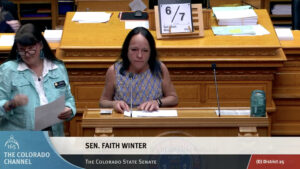
Colorado state Sen. Faith Winter speaks on the Senate floor during the 2023 legislative session.
Indeed, Sen. Faith Winter, D-Broomfield, raised that idea during Tuesday’s debate over SB 106 as proponents and opponents debated the best way to address the skyrocketing insurance rates that have led so many condo builders to pull out of that segment. The study required in HB 1083 would offer more information on the number of claims that have been made against insurance policies and could move the discussion of the effect of defects law beyond anecdotes to hard numbers, she said.
Other building-industry leaders offered numbers specific to their business as evidence that action, rather than further study, is needed. Robert Riva, general counsel for 10-state developer Dream Finders Homes, told the committee Colorado represents 7.5% of his firm’s townhome closings but almost 90% of its legal spending. Michael Gifford, advocacy director of Associated General Contractors of Colorado, cited a contractor who made a $2.2 million fix to a defective roof but had to pay $9 million in a legal settlement to do so.
An exchange between Colorado Concern President/CEO Dave Davia and Winter was illustrative of the chasm in views on the urgency of moving forward with construction-defects reform.
“What’s at risk?”
“What is the risk in trying this?” Davia asked the Senate committee. “The risk in doing nothing is being back here next year saying it just got 10% more expensive on the low end (to buy a home).”
“What’s at risk? At risk is quality housing and consumer protection,” Winter said, reiterating her support for HB 1083 even before it’s reached her chamber. “Because we don’t have those answers, I think it’s premature to move forward.”
The Senate Local Government & Housing Committee will decide on Tuesday whether it’s ready to move forward with legal reform as a part of the affordable-housing package. So far, however, builders seem closer to losing legal protections than to gaining more.
